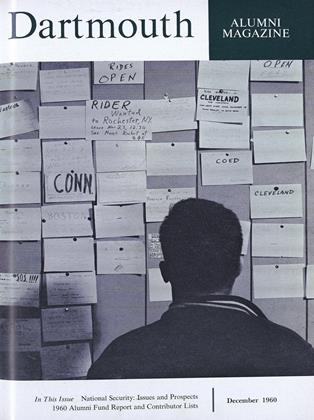THE National Science Foundation has awarded $40,500 over a three-year period to the Department of Pharmacology and Toxicology at Dartmouth Medical School for research on the nature and control of ciliary motion. Cilia, microscopic hairlike structures, line the inside of the nose, sinuses, lower respiratory tract and Fallopian tubes of humans. They wave back and forth under their own power continuously - sometimes as rapidly as 30 times a second. In the nose and respiratory tract this motion causes a thin blanket of mucus to be propelled into the back of the throat and so helps to protect the body from infection and harmful dusts. The Medical School research is concerned with factors, that cause this ciliary motion and how it can be controlled by drugs, chemicals and other means. The research program, directed by Dr. Robert Gosselin, Professor of Pharmacology, was started five years ago. It is also supported by grants from the Public Health Service, the Hitchcock Foundation, and the American Medical Association.
 View Full Issue
View Full Issue
More From This Issue
-
 Feature
FeatureNATIONAL SECURITY: Issues and Prospects
December 1960 By LOUIS MORTON, -
 Feature
FeatureINSTITUTIONAL PURPOSE in the Undergraduate College
December 1960 -
 Feature
FeatureUNDERWATER TREASURE
December 1960 -
 Feature
FeatureThe Man Behind the Figures
December 1960 -
 Feature
FeatureALUMNI FUND ENDOWMENT FUNDS
December 1960 -
 Feature
FeatureCollege's Annual Outlay Now Totals $12 Million
December 1960







